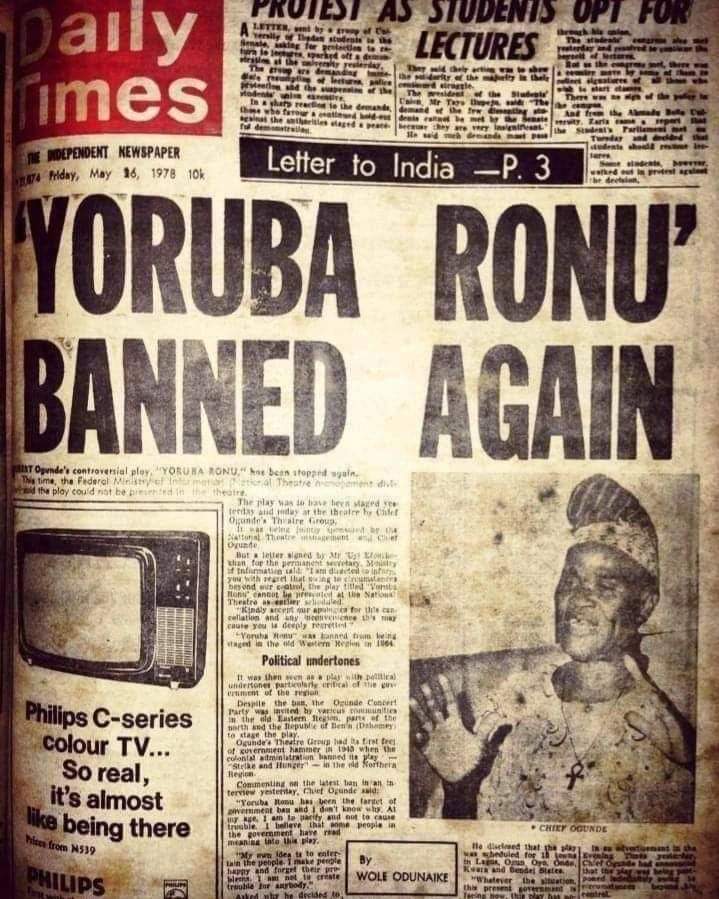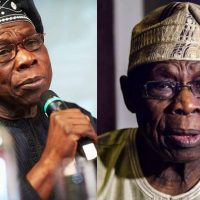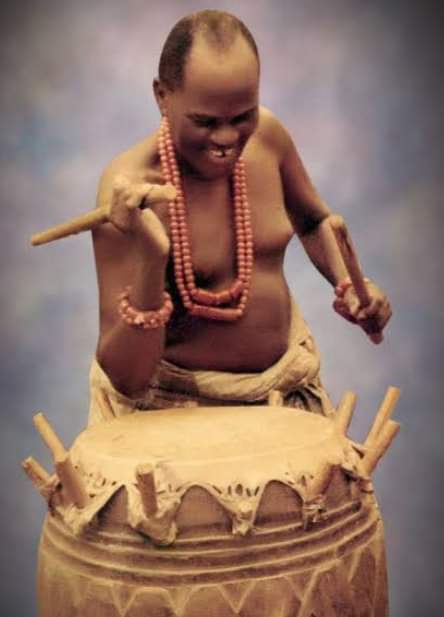A legendary playwright, Chief Herbert Ogunde (10 July 1916 – 4 April 1990) was a theatre Cicero who was famous for his brilliant and amazing artistic works.

In his lifetime Ogunde used the theater as a political voice in the 50s, for Egbe omoduduwa and it was an arsenal that couldn’t be ignored and was a Nigerian actor, playwright, theatre manager, and musician who founded the first contemporary professional theatrical company in Nigeria, the African Music Research Party as far back as 1945.
In 1986, he was invited by the Nigerian government to form a national drama troupe. During this time, he represented Nigeria in the Commonwealth Festival of Arts, performing a play called Destiny.
Ogunde starred in Mister Johnson, the 1990 motion picture that also featured Pierce Brosnan (James Bond). The movie was shot in location at Toro, near Bauchi, Nigeria. Sadly, he fell ill during the shooting of the movie and subsequently passed on.
Today’s generation might not be aware of the artistic dexterity and sheer creativity of this man who, in the course of his lifetime, wrote and performed many spectacular plays and movies and composed several music soundtracks.

However, his lifetime journey smashed the rock when he attempted to lend his voice for the people of Yoruba race against subjugation and oppression of the ruling elites.
Ogunde’s most famous play, Yoruba Ronu (performed 1964; “Yorubas, Think!”), was such a biting attack on the Premier of Western region that his company was banned from the region — the first instance in post-independence Nigeria of literary censorship.
It is my belief that Ogunde felt that unity of Yoruba was necessary and paramount as at that time to have a strong and formidable political base that would usher in several developmental programmes to Yorubaland.
The regime of Obasanjo felt his song at that time could promote disunity and if not banned it could spread to various parts of the country which might not go well with fragile country coming from civil war.
Though the ban was lifted in 1966 by Nigeria’s new military government but his message continues live after his demise.

This resonates with the happenings around us recently as 2023 approaches, several Yoruba people have been divided and the pillar of unity that our forefathers have held unto seems to be shaken everytime transition of power knocks at the door.
What should perturb sensible minds is that our elders who supposed to be teaching the young folks the history of Yoruba in the political firmament have chosen to continue in the trajectory of discord. Alas, they seem to have forgotten the ‘Omoluabi ethos’ usually echoed by them whenever their personal interest is involved.
2023 presidency has pitched several Yoruba to eachother. Our elders have thrown caution to the wind and do not want to allow decorum. As such, they continue to throw tantrums over their political affiliations. They have forgotten that the youth folks are keenly observing the atmosphere and the way the ‘Omoluabi ethos’ has been relegated to the background.
As 2023 beckons, it behooves on us to learn from history and not to turn Oduduwa land to theatre of war as a result of provocative statement from our elders. Yoruba race has been known as intellectual hub of Nigeria and we are far beyond sowing seed of animosity or waving prejudicial thoughts on any of our decision whether political, social or economical.
It is my belief that our unity of purpose would always prevail irrespective of our political affiliations that may be seen as cog in the wheel of progress of Yoruba race.
Yoruba Ronu’ ooooooooo
Ismael Taiwo, is a public affairs commentator and a columnist writing from Ado-Awaye, Iseyin Local Government of Oyo State.



